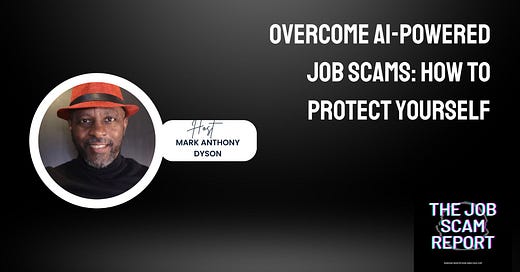Today marks the platform's first anniversary. While most of the content is about job scams, we proudly present relevant job search advice. When we discuss the future of work, navigating the job scam landscape safely is as important as modern job search strategies.
Job scams are as old as job applications, resumes, and cover letters. What makes the last three years different is technology is accessible to anyone, delivering content and job opportunities. Bad actors have always used “Social Engineering” and technology to find vulnerable victims to steal personal information.
Reminders of “how to avoid job scams” are still vital
The HR Honey Badger, Russell Irby, commented he’s seen people fall victim to old schemes. I’ve seen it, too, and have not hesitated to recap and remind people last year’s advice is as relevant now as it was two years ago.
This week’s episode reminds us of some of the basics of combating job scams. The best defense is always awareness, knowledge, and the recognition of red flags. I bring up an old survey I covered to remind us of our commitment to protect ourselves, our job search efforts, and our families and communities.
Here’s the survey from Upwind.io.
Here are some of the highlights:
1. Job Scams and AI: The rise of job scams is aided by advancements in AI technology, which is the same technology everyone has at their fingertips. Scammers use AI to create realistic and targeted schemes at scale.
2. Protection of Personal Information: Protect your personal information during the job search and be choosy about where you apply. Lock your credit information and use unique email addresses and phone numbers for job applications exclusive to your job search.
3. Awareness and Vigilance: Be vigilant and aware of the signs of job scams, such as suspicious communications or unusual requests for personal information. One red flag is one sign too many to disengage from bad actors pretending to be hiring officials to trust.
4. Survey Statistics: Various statistics from Upwind highlight the increasing worries about AI-driven scams and Americans' actual experiences of personal data breaches. It’s a view from 1200 Americans, 87% have been at least confronted with fake job opportunities. 61% have experienced a data breach.
5. Ethical Recruitment Practices: Be cautious when dealing with ethical recruiters and hiring managers, even when they seem legitimate but exhibit red flags. “Scammy behavior” from any professional is not worth engaging.
Where can you find the “The Job Scam Report” podcast?
YouTube (You can download from YouTube Music Podcasts)














Share this post